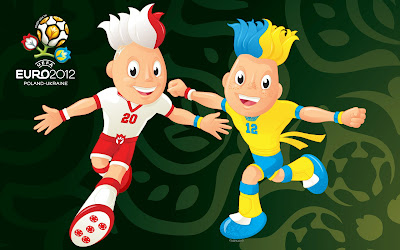UEFA Euro 2012 - UEFA European Football Championship 2012 - Review
UEFA European Football Championship 2012
UEFA European Football Championship 2012, or better known as Euro 2012, will be the 14th European Championship for national football team is supported by UEFA. The tournament finals will be hosted by Poland and Ukraine between June 8 and July 1, 2012. This is the first time a nation also has organized the tournament. The offer is chosen by the UEFA Executive Committee in 2007.
Final tournament featuring sixteen countries, the European Championships last thing to do so (from Euro 2016 and beyond, there will be 24 finalists). Qualification was opposed by 51 countries between August 2010 and November 2011 to join the host country two tournaments. The winner of the tournament to gain automatic entry to the 2013 FIFA Confederations Cup hosted by Brazil.
Host Selection
Joint Polish-Ukrainian bid is selected by vote of the UEFA Executive Committee at a meeting in Cardiff on 18 April 2007. The offer beat bids from Italy and other elected Croatian-Hungarian, became the third successful joint bid for the European Championship, after being in the Belgian- The Netherlands (2000) and Austria-Switzerland (2008).
Qualification
Qualification group draw UEFA European Football Championship 2012 took place in Warsaw on February 7, 2010. teams taking part compete to win the remaining 14 places in the finals. The teams are divided into nine groups with the placement of the draw for the first time based on the latest UEFA national team coefficient.
Qualifying rounds began in August 2010 and ended in November 2011. After all the qualifying matches played over in October 2011, nine of the top teams from each group and the best second place teams automatically qualify for the finals. Second position of the other eight teams play in the half-cage fall away. The four winning teams in the last fall to qualify for the finals.
Team participants
Since 1996, the finals are always featuring sixteen national teams. Some state football associations of Europe supported the proposal increase the number of finalists to 24 tournament teams this issue, despite the addition of a significant number of members of UEFA did not increase the number of finalists from last in 1996 (53 per April 2006 compared to 48 at Euro 1996). In April 2007, UEFA's Executive Committee formally rejected the proposal.
Twelve of the sixteen finalists participated in the previous tournament in 2008. Britain and Denmark who participated in 2004, returned to the show after failing to qualify in the 2008 edition of the tournament. Republic of Ireland comeback after an absence of 24 years, also to make participation a second time in the finals. Ukraine hosts appeared for the first time as an independent state, having been featured as part of the Soviet Union.
Sixteen finalists who performed at the final round are:
Netherlands
Czech Republic
Denmark
English
Republic of Ireland
Italy
German
Croatia
France
Poland (co-host)
Portugal
Russia
Spain (defending champion)
Sweden
Ukraine (co-host)
Greece
Group finals draw
The draw takes place at the Palace of Arts Ukraine, Kiev, Ukraine on December 2, 2011, at 17:00 UTC (19:00 local time).
As in the draw for the finals in 2004 and 2008, sixteen finalists were divided into four pots according to ranking placements UEFA national team coefficient. As co-hosts, Poland and Ukraine occupy Pot 1 automatically, along with Spain, as a champion survive.
In the draw procedure, one team from each pot will be included, each to one of four groups. Will be determined also the position of teams in each group (eg, A2, A3, or A4) to schedule the match. It has been previously determined to fill the position of Poland and Ukraine to fill the position A1 D1, which means, the Netherlands and Spain will only fill position B1 or C1.
Venue
Apart from Donetsk and Kharkiv, all the host cities are popular tourist destinations (the latter has been replaced as the host city of Dnipropetrovsk in 2009). We offer requires expansion and modernization of road and transport networks.
Completion of required infrastructure including the construction of a new stadium soccer: Six of the eight points of the new stadium currently being built ready for use before the tournament; two remaining (in Poznan and Kharkiv) has undergone major renovations to improve it. Three of the stadium will meet the criteria for the highest category UEFA stadium.
In returning to the format used in Euro 1992, Euro 1996 and Euro 2008, each group will be placed around the two stadiums.















0 comments:
Post a Comment